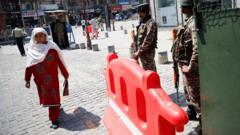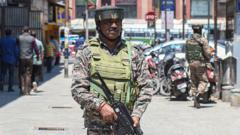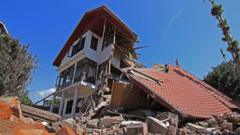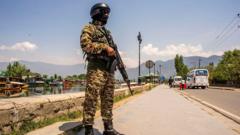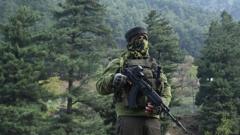In the wake of a deadly militant attack in Kashmir, violence against Kashmiris living in India has escalated, forcing many to flee for their safety. Eyewitness accounts reveal a culture of fear and harassment, exacerbated by political tensions and ongoing military operations.
"Kashmiri Identity Under Assault: Rising Violence and Fear Following Deadly Attack"
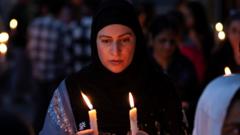
"Kashmiri Identity Under Assault: Rising Violence and Fear Following Deadly Attack"
The recent surge in attacks against Kashmiris, ignited by a tragic incident in Pahalgam, has left many feeling unsafe and unwelcome in their own homes.
In the picturesque hill town of Mussoorie, located in Uttarakhand, a sense of dread has taken hold among the Kashmiri community following a brutal assault on two shawl sellers, Shabir Ahmad Dar and a colleague. Their identities as Kashmiris subjected them to violence after a recent deadly attack in Pahalgam, where 26 people were killed. A right-wing group, incensed by the attack, targeted the pair, accusing them of complicity and demanding they leave town.
"I felt like my identity became a target," Dar stated, recalling the moment when he and his colleague were assaulted and their stall destroyed. The men, once respected figures in their community, now feel afraid to return to their livelihoods as violence against Kashmiri vendors, students, and professionals becomes increasingly prevalent.
The reaction to the Pahalgam attack has been swift and harsh, with many reports surfacing of Kashmiris facing hostility from both the public and authority figures. A nursing student shared her experience of being called a "terrorist" and forced from a taxi after being identified as Kashmiri. The ongoing backlash appears coordinated, with viral videos depicting violent confrontations against Kashmiris in various cities.
In response to the Pahalgam attack, Indian security forces have ramped up their presence in Kashmir, executing mass detentions and demolishing homes of alleged militants—a phenomenon described as "collective punishment" by locals. Critics, including former and current leaders, have condemned these measures, emphasizing the need to differentiate between civilians and militants to avoid harming innocent people.
The psychological toll on Kashmiri civilians has been profound, particularly as many have faced renewed harassment despite the decreasing levels of violence in the region over the past few years. Anuradha Bhasin, editor of the Kashmir Times, articulated the lingering mistrust and vulnerability Kashmiri people experience, noting how they are often perceived through a lens of suspicion.
Emerging voices from the community are calling for peace and understanding, rejecting the blame placed on their identities. Candlelight vigils and protests against the militant attack reflected a unified outcry against violence, yet many now find themselves in a precarious position, grappling with the aftereffects of both societal conflict and governmental repression.
Mohammad Shafi Dar, a daily wage worker, recently faced unimaginable loss when his home was destroyed during military crackdowns, leaving him and his family destitute. His sentiments highlight the family struggles faced by countless Kashmiris, who question how they can be responsible for the actions of others, especially when innocence and suffering collide under such dire circumstances.
The plight of Kashmiris today showcases a complex web of fear, identity, and endurance in the face of violence, underscoring the urgent need for dialogue and understanding beyond mere political narratives.






